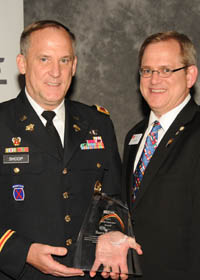ABET approves criteria for optics and photonics engineering undergraduate degrees in United States
Accreditation action is 'key, defining juncture' for the field
 |
| Barry Shoop, at left, with SPIE President-Elect Philip Stahl, was awarded the SPIE Educator Award at SPIE Optics + Photonics in August, for his role in developing and overseeing the implementation of requirements for accreditation of undergraduate degrees in optical engineering. |
BELLINGHAM, Washington, USA -- Recent approval by the Accreditation Board for Engineering and Technology (ABET) for program criteria for optics and photonics engineering in undergraduate degrees confirms the field as one of the critical technologies of the 21st century, say the effort's backers. ABET approved the newly developed criteria during its October board meeting in Baltimore, Maryland, USA.
ABET is a federation of 30 professional and technical societies that acts as the recognized accreditor for U.S. college and university programs in applied science, computing, engineering, and technology.
In 2010, SPIE, the international society for optics and photonics, was designated the lead society for optics and photonics criteria related to curriculum and faculty for the ABET Applied Science Accreditation Commission, and co-lead with IEEE, for similar programs in the Engineering and Technology accreditation commissions.
"I really believe that this is a key and defining juncture for our discipline," said Barry Shoop, professor at the West Point U.S. Military Academy at West Point, who represents SPIE on the ABET board of directors.
Shoop stressed that work toward the approval has been "a massive team effort," and singled out professors Charles Joenathan and Robert Bunch from Rose-Hulman Institute of Technology who first encouraged SPIE to become engaged in ABET.
"The existence and value of bachelor's degree in optical engineering has been largely overlooked," said Carl Maes, a professor at the University of Arizona College of Optical Sciences. "It has been this way in spite of the fact that most people depend upon technology enabled by optics every day of their lives."
Optical engineers provide a trusted and vital profession necessary for innovation, he noted. "ABET approval for optical and photonics engineering as its own field makes possible a greater awareness of the critical role of optics in society. The next generation of engineers will more effectively see optics and photonics engineering as a viable and attractive option for an accredited college degree which they can pursue to help make the world better."
Shoop and the team studied ABET's currently accredited undergraduate engineering programs in optics and photonics to determine common elements and to ensure that any new criteria would encompass existing programs and others that will be developed. He involved representatives from both academia and industry, facilitating a collaborative process to establish standards that satisfied the needs of both entities.
SPIE is the international society for optics and photonics, a not-for-profit organization founded in 1955 to advance light-based technologies. The Society serves more than 235,000 constituents from approximately 155 countries, offering conferences, continuing education, books, journals, and a digital library in support of interdisciplinary information exchange, professional networking, and patent precedent. SPIE provided over $3.2 million in support of education and outreach programs in 2012.
###
Media contact:
Amy Nelson
Public Relations Manager, SPIE
+1 360 685 5478
amy@spie.org
@SPIEtweets